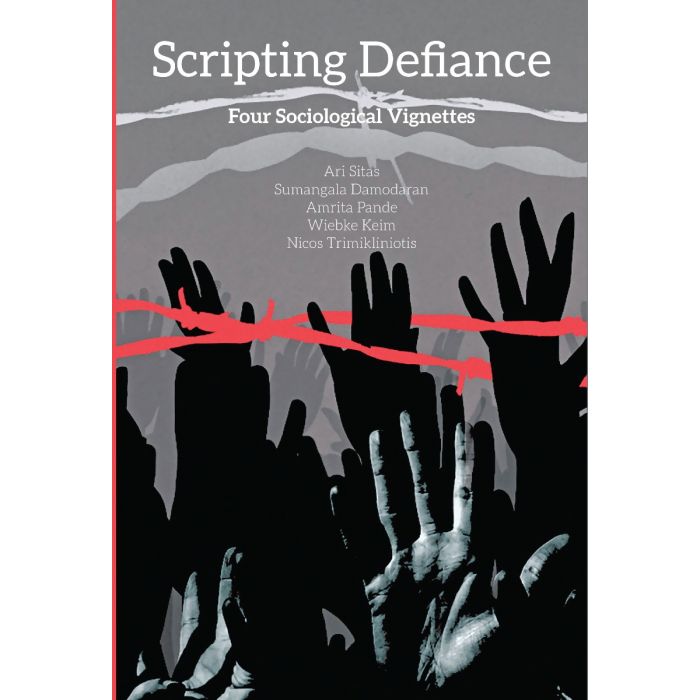
Scripting Defiance: Four Sociological Vignettes by Ari Sitas, Sumangala Damodaran, Amrita Pande, Wiebke Keim and Nicos Trimikliniotis (published by Tulika books in 2022) provides an account of four narratives of defiance centred around the structural elements of authoritarianism and overt systems of domination.
The book’s four sections denoted as Vignettes comprise cases of defiance from the global North and global South. In the first section, Sumangala Damodaran’s Labour’s Powers and Questions of Freedom traces the emergence of the wage-labour market from the early Mita system in sixteenth-century Europe with the story of silver mining in Potosi, Bolivia. Sumangala draws connections with the forms of forced labour that exist in South Asia today and to the early system of forced labour that existed in the Latin American economy. Salient themes such as the freedom of the worker, the emergence of the wage-labour market, and the free worker are detailed in the chapter with a focus on the early informal production systems such as silver mining and a shift to understanding the emergence of contemporary production systems such as the commodification of sugar in the plantation economies. The rise of indentured labour as a new form of slavery, after the collapse of slavery, as a continued system of domination is mapped drawing attention to the resistance of workers against various forms of penal sanctions and overt physical control.
Sumangala’s essay provides a rich theoretical account drawing scholarly references on labour, capitalist accumulation, stigma, and the value of labour. The author also presents a detailed account of the gendered and caste-based regimes of unemployment in India that restrains the agency of the worker by enforcing notions of degraded and stigmatized labour. The chapter Migration and Asylum by Nicos Trimikliniotis defy the notion of ‘territoriality’ and ‘natalism’ in the overall European context due to the surge in migration and asylum-seekers worldwide. Trimikliniotis emphasizes the need to build a debate on global Political Sociology, indicated by Saskia Sassen’s ‘savage sorting’ towards a new multidisciplinary scholarship that encompasses the various dimensions of immigration and asylum. This argument is vital to understand the transformation of the global world order situating the critical issue of migration and asylum as a key site for an informed discussion.
The next chapter by Ari Sitas is a phenomenological account of everyday migrant encounters faced by the migrants and refugees who are subjected to xenophobia and ethnocentrism in the farmlands of South Africa raising the pertinent question of existential crises for the migrants. The migrant narratives presented in the chapter also show the development of defiance by the migrants through a self-understanding or self-exploration of their migrant vulnerability and the formation of resilience and negotiated habitus to navigate these hostile spaces and survive.
The next section begins with the essay by Amrita Pande which is a rich account of sex work tracing from early 18th century India to the evolution of twenty-first-century pleasure economies with a focus on ‘loose women’ who engage in transaction sex in British India and beer-brewing women in South Africa and a critical introspection on the lack of attention given to pleasure in intimate forms of labour. These women workers seen as perverted and morally corrupt have to negotiate with the barriers of race, caste and class.
The chapter on enacting gayness by Jan Louise-Lewin illustrates that in the majority of prison spaces there are expressions of both hegemonic masculinity and contesting masculinities. The author contends that prison inmates in South Africa make use of prison spaces to self-explore their gendered and sexual selves. They elevate the prison space as an agential space and not merely a space of subjugation. The other chapters by authors Javier Perez and Gaetan Cliquennois discuss contemporary gangsterism as an alternative disposition to post-slavery with a focus on the form of resistance and the knowledge that prisoners use for prison reformation with prisoners themselves acting as stakeholders of reformation to achieve transformation.
The third section of the book situates universities as sites of resistance bringing to the fore the peripheralized identities and their voices for progressive change. The chapter provides an account of defiance stemming from both the European and Asian contexts. Tristes Tropiques’ chapter is a discussion on artistic defiance signifying the importance of visual forms and articulatory defiance to threaten the existing system of domination and control. The book ends with the essays of Wiebke Keim illustrating the dynamics of National Socialism in Germany and the far-right parties in France. The nature of bottom-up mobilizations in the French and German far-right discussed in the final section paves the way to opening up the avenues for a global Sociology in the post-fascist society of today. Overall, the book can be essentially credited as a vital resource for contemporary global sociological research.
***
Maria Aishwarya B. is an Assistant Professor in the Department of Sociology, at Stella Maris College, Chennai. She is pursuing her PhD from the Department of Sociology and Social Work, Christ University, Bengaluru.